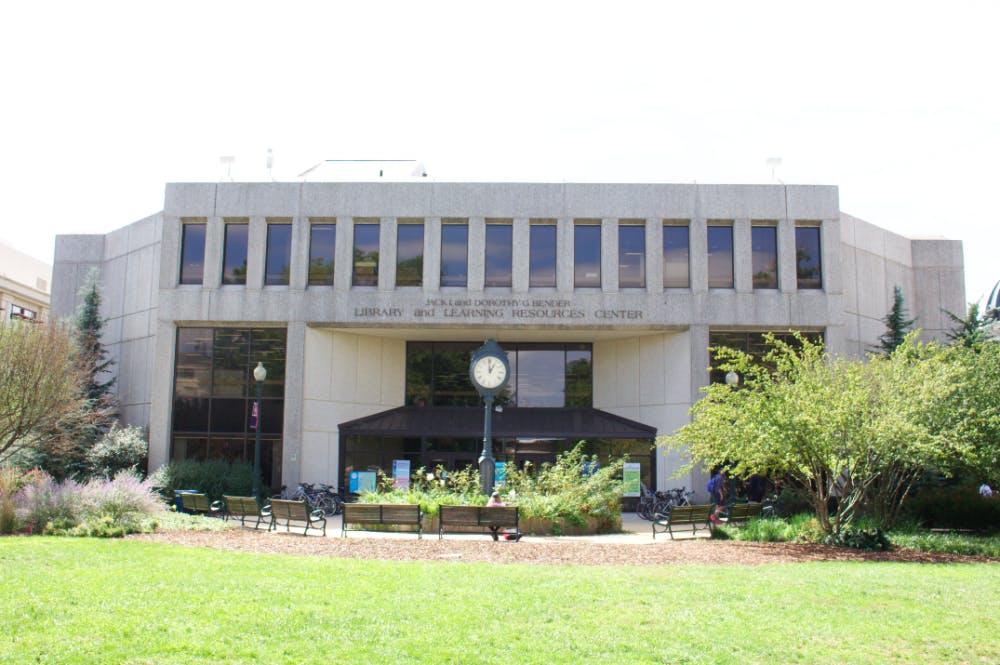Editor’s note: this article originally appeared on theeaglecoronavirusproject.com, a separate website created by Eagle staff at the onset of the coronavirus pandemic in spring 2020. Articles from that website have been migrated to The Eagle’s main site and backdated with the dates they were originally published in order to allow readers to access them more easily.
Bender Library will be closed to students and staff for the next two weeks, as of Friday, March 27. Students will not be able to receive scans of materials past April 10. All additional class materials will need to be accessed online. The library staff plans to reassess their procedures in two weeks.
Director of Access Services Robert Kelshian said they decided to close “all onsite work for the next two weeks and then reassess,” in an email to The Eagle on Friday. Materials will not be scanned during this period, though users can contact the library for help in finding electronic resources and other materials.
Staff members are available from 8 a.m. until at least 9 p.m. to help students, and an overnight chat service is available as well, Kelshian said. The library will be looking to extend hours for other staffed services to accommodate students in different time zones. While some of the service desk phones are being forwarded, students can contact staff members via email.
D.C. Mayor Muriel Bowser ordered for the temporary closure of all non-essential businesses Wednesday at 10 p.m., but this mandate does not apply to the University library. University Librarian Nancy Davenport made the decision to stop onsite work, with approval from Provost Daniel J. Myers.
“It was my recommendation to the provost to stop onsite work because we’ve probably had more people on campus than anyone else to get these scans done,” Davenport said. “All the scanners in the library have been going nonstop.”
Davenport said that textbook and other reading assignments for all classes have been scanned through April 10. “With the mayor’s order and the fact that we were up to date, we put together an extensive list of things to do remotely, and we decided to send everyone home to minimize the transmission of infection,” she said.
Kelshian told The Eagle on Tuesday that staff were working limited hours, and those hours were spread more widely throughout the day to limit interaction. Staff members were not coming into the library more than twice a week, which he said was sufficient in getting materials to users.
“We want to move in a direction where we connect people to online first, print being a resource of last resort,” he said. “We definitely want to start preparing people to not have access to physical materials onsite. We want to urge people to look for versions online, and there's plenty of staff available remotely to help with that.”
Prior to the decision to close onsite work, staff members and student employees were wearing gloves whenever handling library materials, the cleaning staff had been doing more regular cleaning and employees were kept more than six feet apart from each other, Kelshian said.
Due dates were extended until May 31 for library materials already checked out, although this may change.
“As long as people can't get to campus, we're not going to make them pay for materials they can't give back,” Kelshian said. “We’ll keep extending the fines and issuing forgiveness. We don't want to be adding stress to anyone’s experience right now.”
Resources provided through the Academic Support and Access Center have switched to operating online-only, and they will be conducted via Zoom and Blackboard Collaborate Ultra, Assistant Dean of Undergraduate Education Jimmy Ellis said.
“Going online was a priority item for us for accessibility purposes,” Ellis said. “We run the Tutoring Lab, Supplemental Instruction, Writing Center, Math/Stat Lab and Academic Coaching. All of that converted to being online before the first day of classes on [March 18].”
To accommodate students better, Ellis said staff members and student employees have stretched out their hours, making themselves more available to students located across the globe in various time zones.
“With everything we offer, we were either able to scale up to being online only pretty quickly, or it was already in the works,” Ellis said.





